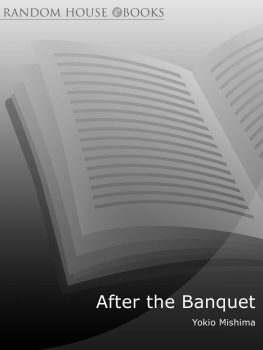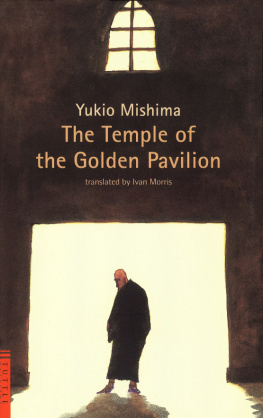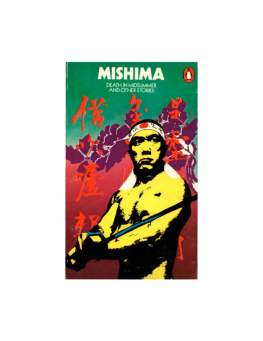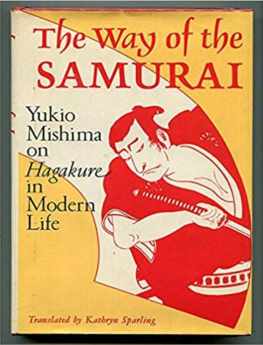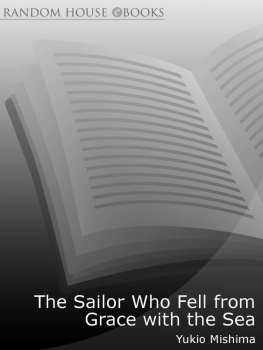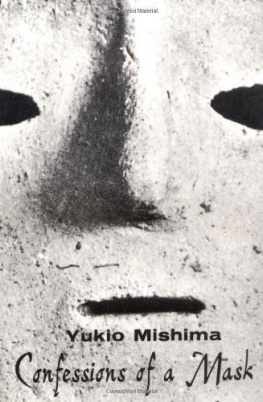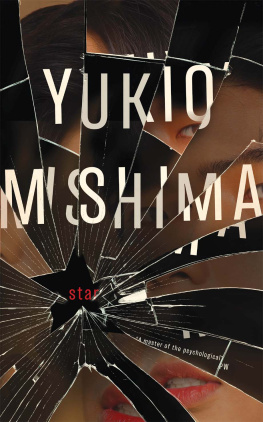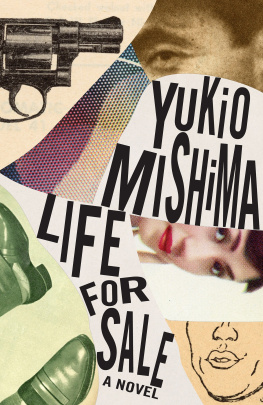AFTERTHE BANQUETYukio MishimaTranslated from the Japanese byDonald Keene
Table of Contents
This eBook is copyright material and must not be copied, reproduced, transferred, distributed, leased, licensed or publicly performed or used in any way except as specifically permitted in writing by the publishers, as allowed under the terms and conditions under which it was purchased or as strictly permitted by applicable copyright law. Any unauthorised distribution or use of this text may be a direct infringement of the authors and publishers rights and those responsible may be liable in law accordingly.
Epub ISBN: 9781407053103
Version 1.0
www.randomhouse.co.uk
Published by Vintage 2001
4 6 8 10 9 7 5
Copyright 1963, copyright renewed 1991 by
Alfred A. Knopf, Inc.
This book is sold subject to the condition that it shall not, by way of trade or otherwise, be lent, resold, hired out, or otherwise circulated without the publishers prior consent in any form of binding or cover other than that in which it is published and without a similar condition including this condition being imposed on the subsequent purchaser
Originally published in Japanese by
Shinchosha as Utage No Ato.
Copyright 1960 by Yukio Mishima
This translation first published in the United States by
Alfred A. Knopf, Inc., New York, 1963
Vintage
Random House, 20 Vauxhall Bridge Road,
London SW1V 2SA
Random House Australia (Pty) Limited
20 Alfred Street, Milsons Point, Sydney,
New South Wales 2061, Australia
Random House New Zealand Limited
18 Poland Road, Glenfield,
Auckland 10, New Zealand
Random House South Africa (Pty) Limited
Isle of Houghton, Corner of Boundary Road & Carse OGowrie,
Houghton 2198, South Africa
The Random House Group Limited Reg. No. 954009
www.randomhouse.co.uk
A CIP catalogue record for this book is available from the British Library
ISBN 9780099282785
Papers used by Random House are natural, recyclable products made from wood grown in sustainable forests.
The manufacturing processes conform to the environmental regulations of the country of origin
Printed and bound in Great Britain by
Antony Rowe Ltd, Chippenham, Wiltshire
About the Author
Yukio Mishima was born into a samurai family and imbued with the code of complete control over mind and body, and loyalty to the Emperor the same code that produced the austerity and self-sacrifice of Zen. He wrote countless short stories and thirty-three plays, in some of which he acted. Several films have been made from his novels, including The Sound of Waves; Enjo, which was based on The Temple of the Golden Pavilion; and The Sailor Who Fell from Grace with the Sea. Among his other works are the novels Confessions of a Mask and Thirst for Love and the short-story collections Death in Midsummer and Acts of Worship.
After Mishima conceived the idea of The Sea of Fertility tetralogy in 1964, he frequently said he would die when it was completed. On November 25th, 1970, the day he completed The Decay of the Angel, the last novel of the cycle, Mishima committed seppuku (ritual suicide) at the age of 45.
BY YUKIO MISHIMA
THE SEA OF FERTILITY, A CYCLE OF FOUR NOVELS
Spring Snow
Runaway Horses
The Temple of Dawn
The Decay of the Angel
Confessions of a Mask
Thirst for Love
Forbidden Colors
The Sailor Who Fell from Grace with the Sea
After the Banquet
The Temple of the Golden Pavilion
Five Modern N Plays
The Sound of Waves
Death in Midsummer
Acts of Worship
THIS TRANSLATION IS DEDICATED TO
Paul C. Blum
CONTENTS
The Setsugoan
The Setsugoanthe After-the-Snow Retreatstood on high ground in a hilly part of the Koishikawa district of Tokyo. It had fortunately escaped unharmed during the war; nothing had been damaged either in the magnificent garden, a noted example of the Kobori Ensh style covering over a hundred thousand square feet, or in the buildings: a central gate moved here from a certain famous temple in Kyoto, an entrance and visitors pavilion lifted bodily from some ancient temple of Nara, and a banqueting hall of more recent construction.
At the height of the upheaval caused by the capital levy after the war, the Setsugoan had passed from the hands of its former owner, an industrialist who dabbled as a tea master, to those of a beautiful, vivacious woman. Under her management the Setsugoan quickly developed into a distinguished restaurant.
The proprietress of the Setsugoan was called Kazu Fukuzawa. A streak of rustic simplicity in Kazus plump, attractive figure, always bursting with energy and enthusiasm, made people with complicated motives who came before her feel ashamed of their complexity. People with drooping spirits, when they saw Kazu, were either considerably heartened or else completely overpowered. Some curious blessing of heaven had joined in one body a mans resolution with a womans reckless enthusiasm. This combination carried Kazu to heights no man could reach.
Kazu radiated open good nature, and her absolutely unyielding disposition had assumed a form both simple and beautiful. Ever since she was a child she had preferred to love rather than be loved. Her air of innocent rusticity concealed a considerable determination to have her own way, and various underhanded acts by petty individuals around her had only served to nurture her infinitely direct and outgoing disposition.
Kazu had for many years enjoyed the company of a number of male friends with whom she had no romantic connections. Genki Nagayama, a politician who worked behind the scenes in the Conservative Party, was a comparatively new friend, but he loved Kazu, twenty years his junior, as he might a younger sister. You wont find many women like her, he would always say. One of these days shes going to do something sensational. It wouldnt be too much for Kazu if you told her to stand Japan on its head. Any man with her ability would rank as a child of destiny, but the most you can say about Kazu, since shes a woman, is that shes got plenty of natural endowments. When the day comes that a man coaxes some honest-to-goodness love out of her, shell really explode.
Nagayamas comments did not upset Kazu when they were relayed to her, but a few days later, sitting beside him, she said, Youll never coax any romance out of me, Genki. I dont respond when a man comes charging at me bursting with confidence. Youre clever enough when it comes to sizing up people, but youre no good at persuasion.
Ive no intention of trying to persuade you. If ever I tried courting you, that would be the end of me! There was malice in the old politicians tone.
The maintenance of the garden of the Setsugoan was all that its popularity demanded. The focal point of the garden, especially at moon-viewing parties, was a pond directly south of what had been the visitors pavilion of a Nara temple. Trees of an age and grandeur rarely encountered nowadays in Tokyo surrounded the garden, and each pine, chestnut, nettle tree, and oak rose majestically into a blue sky untroubled by the face of any incongruous modern construction. A pair of kites had for years been accustomed to build their nest at the top of one of the trees, a conspicuously tall pine. Every variety of bird visited this garden at its appointed time of year, but nothing could compare to the numbers and din in the migration season, when flocks of birds swooped down from the sky to peck at the nandin fruits or the insects in the broad expanse of lawn.
Next page
